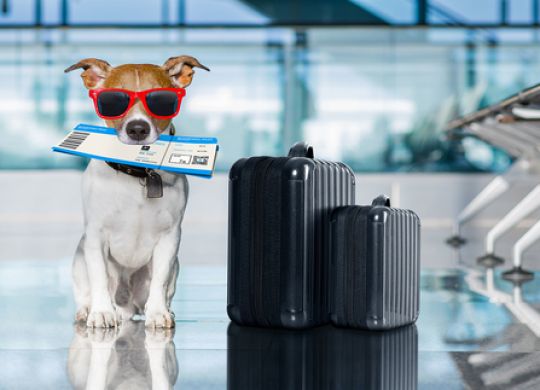Rules for traveling with pets in 2024: Europe, USA and Canada

Traveling abroad with your pet will be easy and comfortable if you prepare documents in advance and provide your furry friend with all the necessary conditions. Learn more about the rules of traveling with pets in Europe, the USA and Canada
Vacations with pets have become a real global trend. According to Condor Ferries, 53% of pet owners travel with their pets. However, how difficult is it for owners who are attached to their pets to organize a vacation abroad? It is quite realistic, with two options: leave the animal in care or take it with you.
Both options have pros and cons that need to be carefully weighed. You can leave your pet in the care of trusted friends, volunteers, or dog handlers whom you trust. In large cities, there are also pet hotels where your pet will be well cared for and feel good.
However, not all animals can withstand a long absence of their owners. They can develop stress and lose their appetite, which can lead to illness. This can make you worry and prevent you from fully relaxing on vacation.
For those who decide to travel with a pet, it is important to prepare thoroughly. This will help ensure comfort for both you and your pet while traveling.
Most countries around the world have rules and requirements for travelers who enter with pets. What do you need to travel with your pet to the EU, the US, and Canada? Let's find out below.
Rules for traveling in Europe with pets
Only dogs, cats, and small rodents can accompany their owners when traveling to any European country. The maximum number of animals you can take with you is 5. If you plan to transport more than 5 animals, this is possible only if you are participating in competitions, exhibitions or sporting events or preparing for them. In this case, the animals must be over 6 months old.
To enter Europe, a pet must have a number of vaccinations and supporting documents.
First of all, you will need a European-style pet passport, which is issued by an authorized veterinarian after checking the documents and the animal's health. This document is filled out in English and is valid for the entire life of the animal.
You will also need a microchip or a clear tattoo. A microchip is a small chip that is inserted under the animal's skin. It contains basic information about the animal, including the country of origin, breed, color, name, vaccinations, owner's name, and contact number. The chip data must match the documents provided and be in the electronic database, and the chip barcode must be pasted into the veterinary passport.
Before traveling, it is necessary to vaccinate the animal against rabies. At the first vaccination, protection occurs in 21 days, with booster doses - immediately. In addition, a test for rabies antibody titers is mandatory, which is carried out by an authorized veterinarian no later than three months before the animal is taken abroad.
For dogs, an additional requirement is treatment against tapeworm (Echinococcus multilocularis), which must be carried out at least 1-5 days before arrival in Finland, Ireland or Malta.
After completing all the previous steps, you must obtain a health certificate from a certified veterinarian. It must contain information about the chip or tattoo, rabies vaccination, antibody titer test results, and tapeworm treatment. The certificate must be issued no more than 10 days before the border control.
The owner of the animal or an authorized person must also fill out a declaration of non-commercial nature of the trip.
Take care of the transportation of animals: for traveling by train, bus or plane, it is better to purchase a special container that meets IATA standards. Carrier bags are suitable for short trips or public transportation. Choose a carrier based on the size and weight of your pet.
Planning a trip or move abroad? An important part of a successful trip is an insurance policy, as it guarantees high-quality medical care anywhere in the world and can protect you from unnecessary expenses while travelling. You can buy insurance from trusted agents on the Visit World portal.
Traveling with pets to the United States
The specifics of entering the United States depend on the type of pet you plan to travel with.
Dogs
To bring dogs to the United States, you must obtain a permit from the Center for Disease Control and Prevention (CDC). Each adult can bring a maximum of two dogs that are at least 6 months old. If your dog has spent the last 6 months in another country, check the list of countries with a high risk of rabies to see if the same requirements apply.
The CDC recommends that you apply for a dog import permit 8 weeks before you travel. To do this, you need to have your dog vaccinated against rabies 13 weeks before your trip. Here's what you need to get a permit:
1. Microchipping: If your dog does not have a microchip, it must be installed. The microchip must be ISO compliant (most veterinary clinics use such chips).
2. Vaccination: After microchipping, get your dog vaccinated against rabies. The veterinarian must fill out a CDC certificate of vaccination and chipping.
3. Serologic titer test: 30 days after the rabies vaccination, have a serologic titer test done by a certified laboratory. Blood can be drawn at the veterinary clinic and sent to a CDC-approved laboratory for analysis. You can request expedited processing for faster results.
4. Submitting the application: As soon as you receive the test results, apply for a CDC authorization by attaching the following documents:
- CDC rabies vaccination and chipping certificate completed by your veterinarian;
- Serological titer results (with a certified translation if not in English);
- Two clear photos of the dog's teeth (front and side view);
- A photo of your passport.
The obtained permit is valid for entry from 14 days before the planned date of arrival and up to 90 days after.
Your dog must arrive at one of the 18 airports with a CDC quarantine facility, including Anchorage, Atlanta, Boston, Chicago, Dallas, Detroit, Honolulu, Houston, Los Angeles, Miami, Minneapolis, New York, Newark, Philadelphia, San Francisco, San Juan, Seattle, and Washington Dulles.
Upon arrival in the United States, your dog must be re-vaccinated against rabies within 10 days.
Cats and other pets
According to official information, the CDC (Center for Disease Control and Prevention) does not require a health certificate for domestic cats to enter the United States. However, some airlines or states may require such a document. Pets are subject to inspection at ports of entry and may be denied entry if they show signs of a communicable disease that can be transmitted to humans. If the cat appears to be ill, additional examination by a licensed veterinarian may be required at the owner's expense.
When planning a trip to the United States, check the pet policy of your chosen airline. Find out if there is an additional fee for transporting your pet and if additional health documents, such as a veterinary certificate, are required. Find out how long it takes to check your pet in for the flight and whether it can be transported in the cabin or only in the cargo hold. Check the size requirements for the pet carrier. These rules are usually available on the airline's website.
Traveling with pets to Canada
If you're planning to move to Canada with your pet, it's important to know how to prepare for your trip. Canada has more lenient rules for importing animals compared to the United States or the European Union, which simplifies the process of preparing documents.
First of all, you will need an international veterinary passport. This is the main document for traveling with animals, which must contain records of all vaccinations. You also need to have a separate rabies vaccination certificate certified by a state veterinarian. It is important that your pet is at least three months old to receive this certificate.
Additionally, you will need a titer certificate that confirms the presence of rabies antibodies in the animal. This certificate is usually checked at the airport. Another important document is an international veterinary certificate or Form 1 - VET, which is issued by a state veterinary institution. This certificate is valid for only three days, so you need to plan a visit to the veterinarian in advance with your pet and all the necessary documents.
A microchip for pets is not mandatory in Canada, but it can provide additional peace of mind. However, for commercial dogs, a microchip is only required for animals over eight months of age.
Upon arrival in Canada, all animals are inspected by the Canadian Border Services Agency (CBSA), where they check the validity and compliance of documents. If your documents do not meet the requirements, you will be redirected to the Animal Health Division (CFIA). There you can get additional services, including animal vaccination, which is subject to a fee.
New airline for dogs
Starting in October, dog owners can travel to Paris, New York, Los Angeles, London, and other cities with Bark Air, an airline created specifically for dogs. Bark, a company known for its dog products, founded the airline, which made its first flight in May 2024. Feedback on the new airline has been overwhelmingly positive.
Unlike other airlines that allow dogs to be transported in the cargo hold or, in some cases, on board the aircraft, Bark Air provides a first-class service without the use of cages. Passengers with dogs can enjoy a stress-free, luxurious journey with a personalized concierge for their pets.
Bark Air planes are equipped with the needs of dogs in mind: pheromones, soothing music, and calming colors are used. Passengers just need to arrive an hour before takeoff, which helps to avoid stress at the airport. Snacks, drinks, treats, and toys are waiting for them on board. Flights are currently available for booking between Chicago, London, Los Angeles, Miami, New York, Paris, Phoenix, and San Francisco.
Are you planning to travel or move abroad? An important component of a successful trip is a travel insurance policy, because it guarantees the provision of high-quality medical care in any corner of the world and is able to protect you from unnecessary expenses during the trip. You can buy insurance from verified agents on the Visit World portal.
Products from Visit World for a comfortable trip:
Travel guide for 200 countries;
Legal advice from a local specialist on visa and migration issues;
Travel insurance around the world (please select the country of interest and citizenship to receive services);
Medical insurance all over the world.
We monitor the accuracy and relevance of our information, so if you notice any errors or inconsistencies, please contact our hotline.
Recommended articles
2 min
Travels
Top 6 best places in the world to observe wildlife
Our world is filled with incredibly beautiful, amazing and fantastic wildlife. Each place offers its own unique combination of animals and landscapes. Find out where the best places in the world are to connect with nature and what to consider when planning your trip
19 cze. 2024
More details2 min
Travels
The most dangerous countries by the number of shark attacks: a detailed rating
Popular tourist destinations have been recognized as the most dangerous by the number of shark attacks. Learn more about which countries have recorded the highest number of unprovoked shark attacks on tourists
28 cze. 2024
More details2 min
Events
Olympics in Paris 2024: where to stay and what to do between competitions?
Paris is one of the most visited tourist cities in the world. This year, the capital of France will host the Summer Olympic Games for the first time in 100 years. More than 15 million tourists are expected to visit the city. Find out what to do and see between races and where to stay in Paris to be in the heart of the action
25 cze. 2024
More details3 min
Travels
The most common mistakes when applying for a Schengen visa in 2024
Summer is the perfect time for exciting travels in Europe! Obtaining a Schengen visa is the first step on the way to fun and new experiences. Learn more about the most common mistakes to avoid when applying for a Schengen visa
29 cze. 2024
More detailsAll materials and articles are owned by VisitWorld.Today and are protected by international intellectual property regulations. When using materials, approval from VisitWorld.Today is required.
